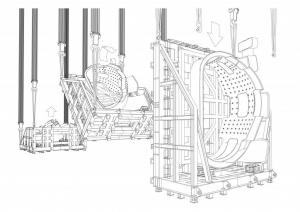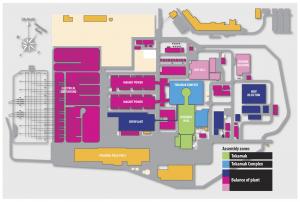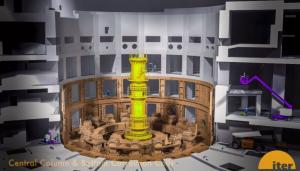Assembly overview

The ITER Organization has overall responsibility for the successful integration and assembly of components delivered to the ITER site by the seven ITER Members. This includes the assembly of the ITER tokamak, with its estimated one million components, and the parallel installation and integration of plant systems such as radio frequency heating, fuel cycle, cryogenic, cooling water, vacuum, control, and high voltage electrical.
Hundreds of thousands of assembly tasks, organized into construction work packages, have been carefully planned and organized by ITER engineers and schedulers. In its role as overall assembly integrator, the ITER Organization is assisted by contractors and a Construction Management-as-Agent (CMA).
The construction platform has been divided into three distinct assembly zones: Worksite 1, green (Tokamak Pit, Assembly Hall and Cleaning Building) focused on the assembly of the ITER tokamak; Worksite 2, light blue, focused on Tokamak Complex plant systems directly connected to the machine; and Worksites 3-6, pink and dark blue, for balance of plant activities (all plant and auxiliary buildings).

2020
Start of Machine Assembly

2033
Cryostat Closure (baseline proposal)

2033-34
Integrated Commissioning (baseline proposal)

2034
Start of Research Operation (baseline proposal)
Assembly phase I
This is the principal assembly phase of ITER, designed to prepare the machine for the Start of Research Operations. In addition to assembling the core machine, which ends with the closure of the cryostat, systems such as the divertor, fuelling, heating, disruption mitigation and a first set of diagnostics will be installed.
Integrated Commissioning I
During this phase, the superconducting coils are operated at nominal current levels and ramp rates, high quality vacuum is demonstrated and leak tests are run, and the systems needed for Start of Research Operations are commissioned.
Assembly phase II
By the end of the assembly phase that will follow Start of Research Operations, the ITER machine will have a fully cooled tungsten first wall and divertor, a full array of heating systems and a near-complete set of diagnostics, all in-vessel coils for stability and ELM control, and a first set of tritium test breeding modules.
Integrated Commissioning II
The second integrated commissioning phase will prepare the ITER machine for Deuterium-Tritium Operation. Systems to be commissioned include neutral beam injection, tritium plant systems, test blanket systems, and the control/safety/interlock systems required for fusion operation.












